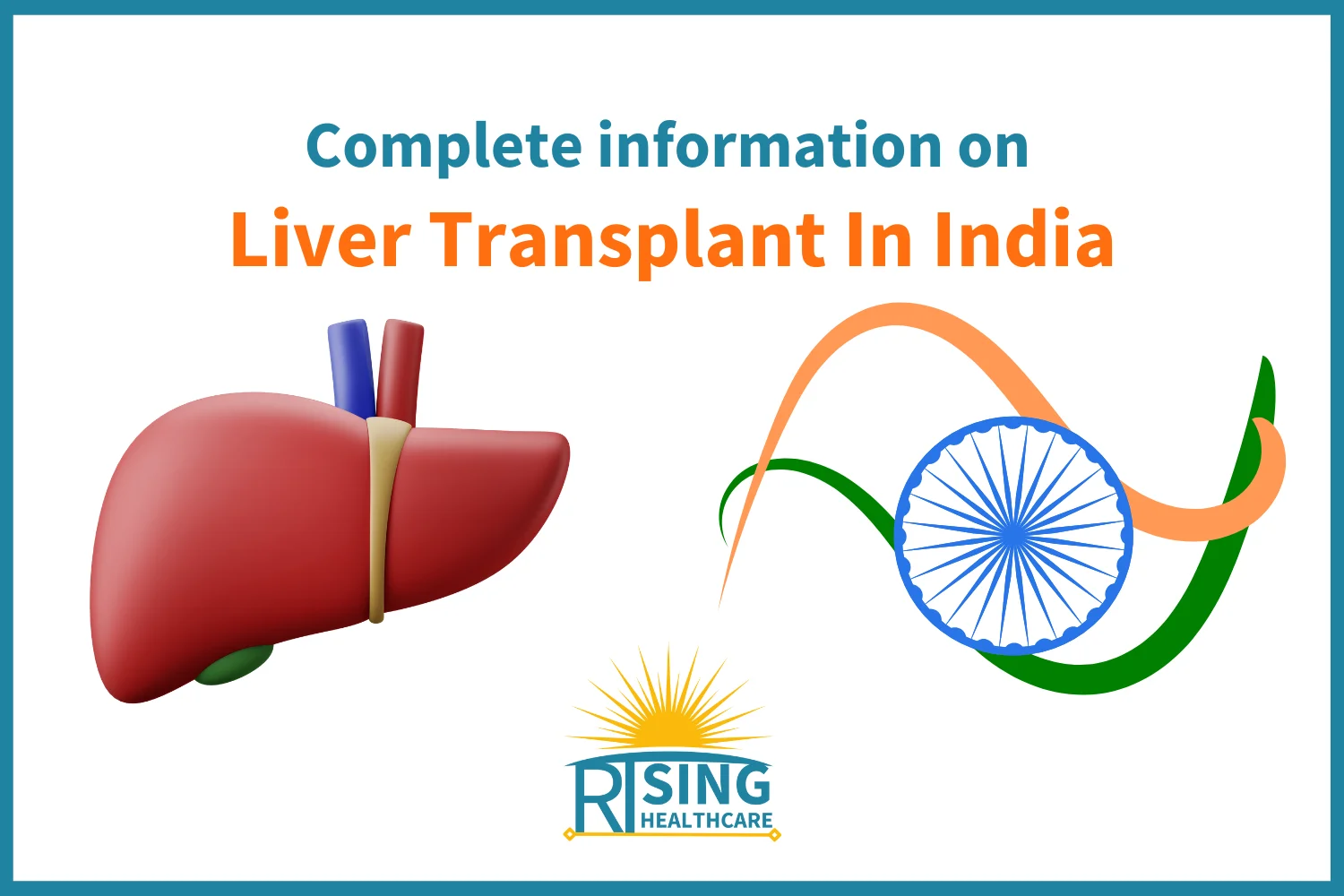
Liver Transplant in India has increased over the years, With the advancement in technology and the procedure the transplant performance has also improved in India. The high demand for liver transplant in India has produced many experienced doctors.
Contents
Liver Transplant in India
Liver transplant surgery is a procedure in which the defective liver of the patient is replaced by the healthy liver of another person who is also known as the donor. Rising Health Care provides the best medical services to patients searching for a top liver hospital in India.
While going through the procedure of liver transplant in India there are many things to be kept in mind along with searching top liver hospital in India like, not every donor can donate his or her organ because the reports of the donor should match the reports of the receiver but the donor can be a family member or the outsider that will not matter.
The most important thing to note is that this is the only organ that can grow itself over time. So the donor, as well as the receiver, can live a healthy life with some part of the healthy liver inside their body as it will grow with time. This is the main reason that while liver transplant only a small portion of the donor liver is taken for the receiver and not the complete organ.
Why do we need to undergo the liver transplant surgery?
The liver is the most crucial part of the human body as it supports metabolism, immunity, digestion, detoxification, and vitamin storage. We need a healthy liver to live a healthy life. If at any time liver is found ill the patient is recommended to undergo a liver transplant procedure and for this mostly people search for best liver treatment hospital in India.
There can be many reasons for liver failure and some of them are as follows:
- Cirrhosis: This type of issue is majorly caused due to excessive intake of alcohol. This is one of the most common reasons for the liver to be damaged. In this condition, the healthy tissues of the liver are replaced by damaged tissues so this affects the liver health badly.
- Hepatic Necrosis: It is caused due to direct hepatotoxin and depends upon the dosage rather than idiosyncratic. It affects the liver when the liver tissues cease their functions.
- Viral Hepatitis: In this type of Infection liver inflammation happens all across the organ. Several different viruses cause hepatitis, including hepatitis A, B, C, D, and E.
- Metabolic Diseases: It is a kind of disease that includes Wilson’s disease, hemochromatosis, familial amyloidotic polyneuropathy, Alpha-1-antitrypsin deficiency, tyrosinemia, glycogen storage disease, and other related disorders that change the chemical processing of the cells. It also affects the liver and a person needs to undergo a liver transplant surgery.
- Early-stage Liver Cancer: When the early stage liver cancer appears there is unintentional weight loss, nausea and vomiting, general weakness and fatigue, abdominal swelling, and jaundice and due to this eyes and skin colour turns yellow. This type of tumour starts developing in the liver but this is the early stage and can be cured by liver transplant surgery.
Major Symptoms of Liver Transplant
There are some of the major symptoms due to which a person should undergo a liver transplant surgery that is as follows:
- Jaundice
- Gastrointestinal bleeding
- Encephalopathy
- Fluid retention
Requirement for the donor to donate according to best liver hospital in India
Before undergoing a liver transplant surgery the donor need to be evaluated and checked properly. There are certain criteria for a donor to donate his or her lungs to the recipient.
- Must be in good physical and mental health.
- Must be between the ages of 18 and 60.
- Must have a body mass index (BMI) that is less than 35.
- Must have a compatible blood type with the recipient.
- Must be free from the following: Significant organ diseases (i.e., heart disease, kidney disease, etc.)
Criteria to Undergo A Liver Transplant
Liver transplantation is a complex procedure that is reserved for individuals with severe liver disease or acute liver failure. There is a high demand for liver transplant in India so that is why when you search for a liver transplant you will get to know that there is the best liver transplant hospital in Delhi India. To determine eligibility for a liver transplant, certain criteria are established. These criteria include:
- The severity of Liver Disease: Candidates must have advanced liver disease, such as cirrhosis, that significantly impairs liver function. Diagnostic tests and scoring systems help assess the severity of the condition.
- Life-Threatening Condition: The patient’s condition should be life-threatening, with a high risk of mortality without a transplant within a short period.
- Absence of Contraindications: Certain factors, such as active substance abuse or severe heart or lung disease, may exclude a patient from receiving a transplant.
- Psychological and Social Evaluation: Candidates undergo an evaluation to ensure they have a support system and can cope with the demands of post-transplant care.
- Lack of Suitable Alternative Treatment: Other medical and surgical therapies should have been exhausted without success.
- Expected Post-Transplant Compliance: Patients must demonstrate a commitment to adhere to post-transplant care requirements.
These criteria help transplant centres determine the most appropriate candidates for liver transplantation based on the available donor organs and the individual’s overall health and prognosis. It is important to consult with a transplant specialist to determine if a liver transplant is the best course of action for a particular patient.
Complications of Liver Transplant Surgery
Liver transplant surgery is a major procedure that can be accompanied by various complications. There are best liver treatment hospital in India where doctors make best use of advancements in surgical techniques and post-operative care have reduced the risks, complications can still occur. Some common complications include:
- Rejection: The body’s immune system may identify the transplanted liver as foreign and attempt to attack it, leading to rejection. Immunosuppressive medications are prescribed to prevent this.
- Infection: Infections can occur due to the weakened immune system after transplantation. Strict precautions are taken to minimize the risk of infections.
- Bleeding: Surgery involves major blood vessels, which can lead to bleeding. Immediate medical attention is crucial to control bleeding.
- Bile Duct Complications: Bile ducts can become narrowed or develop leaks, requiring intervention through procedures like endoscopic stenting or surgical revision.
- Organ Failure: In some cases, the transplanted liver may not function properly, leading to graft failure. In such cases, a re-transplantation may be necessary.
- Side Effects of Medications: Immunosuppressive medications used to prevent rejection can have side effects, including increased susceptibility to infections, kidney problems, and metabolic disorders.
Patients need to be aware of these potential complications and closely follow the post-transplant care plan to minimize risks and ensure a successful recovery. Regular monitoring and communication with the transplant team are crucial in managing and addressing any complications that may arise.
Side-effects of anti-rejection medicine side effects may cause:
After a liver transplant, one of the key components of post-transplant care is the use of immunosuppressive medications. These medications are essential to prevent rejection of the transplanted liver by suppressing the body’s immune system. While they play a crucial role in the success of the transplant, it’s important to be aware of their potential side effects. Here are some common side effects associated with anti-rejection medications:
- Increased Susceptibility to Infections: Immunosuppressive drugs weaken the immune system, making individuals more susceptible to infections. Common infections may include respiratory infections, urinary tract infections, or viral infections.
- Kidney Problems: Some anti-rejection medications can affect kidney function. This may lead to conditions such as high blood pressure or kidney damage. Regular monitoring of kidney function is necessary to detect any abnormalities early.
- Metabolic Disorders: Certain medications can cause metabolic changes in the body, such as increased cholesterol or blood sugar levels. Regular monitoring and appropriate management of these metabolic effects are crucial.
- Bone Thinning: Long-term use of immunosuppressive drugs may contribute to bone loss, leading to osteoporosis or increased risk of fractures. Adequate calcium and vitamin D intake, along with regular exercise, can help mitigate this risk.
- Gastrointestinal Issues: Some individuals may experience side effects such as stomach upset, nausea, or diarrhoea due to the medications.
It’s important to note that not all individuals will experience these side effects, and the severity may vary. Transplant teams closely monitor patients and adjust medication dosages to find the right balance between preventing rejection and minimizing side effects. Regular follow-up visits and open communication with the transplant team are crucial in managing any side effects that may arise.
While the side effects of anti-rejection medications can be challenging, it’s essential to weigh them against the benefits of a successful liver transplant. Close adherence to medication schedules, maintaining a healthy lifestyle, and regular medical check-ups can help mitigate the impact of these side effects and ensure the best possible outcome for the transplant recipient.
Investigations and Tests required for patients and donors before Liver Transplant.
Liver transplantation is a complex procedure that requires a thorough evaluation of both the recipient (patient) and the potential living donor. This evaluation process involves a series of investigations and tests to ensure the suitability of the transplant and minimize risks. Here are some of the common investigations and tests conducted:
- Patient Evaluation: a. Medical History: A detailed medical history is taken to assess the patient’s liver disease progression, previous treatments, and any underlying conditions. b. Physical Examination: A comprehensive physical examination helps identify any signs or symptoms related to liver disease. c. Blood Tests: Various blood tests are conducted to assess liver function, determine blood type, and check for viral infections like hepatitis B and C. d. Imaging Studies: Imaging techniques like ultrasound, CT scan, or MRI are used to evaluate liver structure, detect any abnormalities, and assess blood vessel anatomy. e. Cardiac Evaluation: Cardiac assessment, including electrocardiogram (ECG) and echocardiogram, helps determine the patient’s heart health before surgery. f. Pulmonary Function Tests: Lung function tests assess the patient’s respiratory capacity and detect any underlying lung disease.
- Donor Evaluation: a. Blood Tests: Blood typing, cross-matching, and antibody testing are performed to ensure compatibility between the donor and recipient. b. Imaging Studies: Similar to the patient evaluation, imaging studies help evaluate the donor’s liver structure and blood vessel anatomy. c. Liver Biopsy: A biopsy may be performed to assess the health and quality of the donor liver. d. Psychological Evaluation: Donors undergo psychological assessment to ensure they fully understand the procedure and have the necessary support.
- Additional Evaluations: a. Transplant Infectious Disease Evaluation: Screening for infectious diseases, such as HIV and tuberculosis, is essential for both patient and donor. b. Nutrition Assessment: A nutritionist evaluates the patient’s nutritional status and provides guidance to optimize nutritional support. c. Social Evaluation: Social workers assess the patient and donor’s support system, including financial resources and availability of a caregiver post-transplant.
These investigations and tests help the transplant team determine the eligibility of both the patient and the donor, assess the risks, and plan the transplantation procedure accordingly. The results guide the decision-making process and ensure the best possible outcomes for both the recipient and the donor. It’s crucial for patients and potential donors to actively participate in the evaluation process and communicate openly with the transplant team.
Liver Transplant in India
Liver transplantation is a life-saving procedure for individuals with end-stage liver disease. While the procedure can be expensive in many countries, India has emerged as a popular destination for affordable liver transplants. The liver transplant cost in India is significantly lower compared to Western countries, making it an attractive option for patients seeking quality healthcare at a more affordable price.
People generally check liver transplant cost in aiims delhi or liver transplant cost in delhi when it comes to liver transplant requirement. So for your reference we bring to you a complete info on the liver transplant cost in india in rupees.
Here are the proper pricing for liver transplant cost in India in rupees:
| # | Treatment | Cost Starts From ($) | Hospital Stay |
|---|---|---|---|
| 1 | Liver Transplant | 24000-28000 | 10-20 Days |
| 2 | Liver Cirrhosis | 2000-2400 | 10-15 Days |
| 2 | Hepatitis B Treatment | 800 | 5 Days |
| 2 | Liver Cancer | 4000-4400 | 5-6 Days |
| 2 | Liver Resection | 5600-6400 | 5-6 Days |
| 2 | Pediatric Liver Transplant | 16000-18400 | 7-8 Days |
The average cost of a liver transplant in India can vary depending on several factors such as the liver transplant hospital in India, surgeon’s fees, type of transplant (cadaveric or living donor), pre and post-operative care, diagnostic tests, and medications. On average, the cost of a liver transplant in India can range from $60,000 to $80,000, which is considerably lower compared to countries like the United States, where it can exceed $500,000.
The lower cost of liver transplantation in India does not compromise the quality of medical care. Indian hospitals and transplant centers are equipped with state-of-the-art infrastructure, modern technology, and experienced medical professionals who are skilled in performing liver transplant surgeries. Many transplant centers in India have internationally recognized accreditations and follow stringent quality standards.
Patients considering a liver transplant in India should thoroughly research and choose reputed liver transplant hospital in india with a successful track record and positive patient testimonials. Consulting with a medical tourism facilitator or seeking guidance from a healthcare professional can also help navigate the process and make informed decisions.
Overall, India’s affordable liver transplant costs, coupled with high-quality medical care, have made it a preferred destination for patients seeking a cost-effective solution for their liver transplant needs.

